Are Red Bull on the verge of beating Mercedes?
- Published
- comments
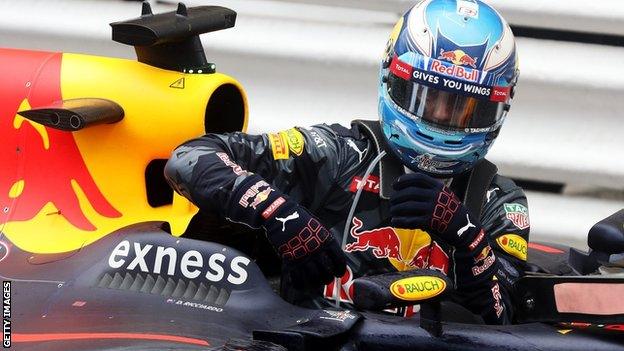
Red Bull drivers have finished on the podium in three of the past four races
Red Bull have taken a win, a second place and a pole position from the last two races - and should have won them both. But does that mean they head to the next race in Canada as a genuine threat to Mercedes?
In Monaco last weekend, they were every bit as quick as the world champions - and Daniel Ricciardo only lost the win to Lewis Hamilton because of a pit-stop mix-up.
Red Bull were victorious in Spain two weeks before that; Max Verstappen picking up the pieces on his debut for the team after a poor strategy decision messed up Ricciardo's chances.
On its own, though, this does not necessarily make Red Bull contenders for victory everywhere. At least not yet. But their rate of car development is second to none so Mercedes will be looking over their shoulders.
The new Renault engine that Ricciardo used in Monaco, and which both cars will use in Montreal next weekend, is definitely a useful upgrade at about 30bhp.
But that in itself is not what made the car so strong there. That was down to their fantastic slow-corner performance.
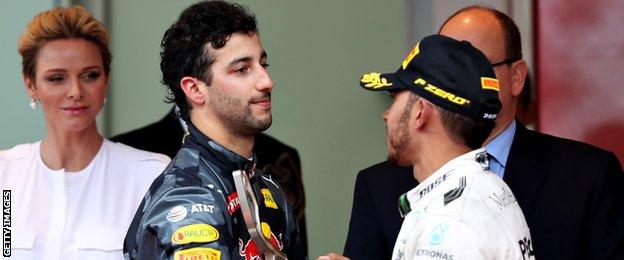
After Monaco, Lewis Hamilton (right) heaped praise on Daniel Ricciardo, describing him as one of the best drivers he has ever raced against
Ricciardo was absolutely phenomenal in sector three in Monaco - the speed he took into the second swimming pool corner was breathtaking, and he carried that pace through the remainder of the lap. He had 0.3secs on everyone all weekend there.
Those are very like the sorts of corners that abound at the Circuit Gilles Villeneuve in Canada.
Montreal is a much faster track than Monaco - but that's because it has long straights. The corners are all short, point-and-squirt.
Red Bull will be very quick in the corners - and the engine will make a bigger difference for them in Canada than it did in Monaco.
But, even with the upgrade, Renault still have a power deficit to Mercedes - of about 20-30bhp, which will show up on initial acceleration out of the corner. The Mercedes is still a very good car. And Hamilton, in particular, is especially good around Montreal.
With that engine shortfall, I suspect Red Bull will not have quite enough to compete on a level playing field with Mercedes in Canada and the next race in Austria.
But I am really looking forward to seeing how they go in Silverstone, with its long corners that reward aerodynamic excellence, and Hungary after that.
The life and times of Max Verstappen
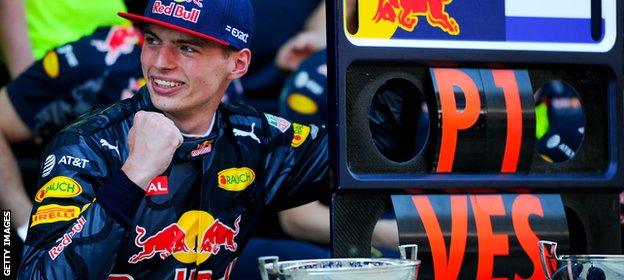
After taking a surprise win on his debut with Red Bull in Spain, Verstappen endured an error-strewn Monaco GP and crashed out
For Ricciardo's team-mate Max Verstappen it has been very much a question of 'what a difference two weeks makes'.
Over the course of one fortnight, the Dutchman went from being a Toro Rosso driver in the Russian Grand Prix to winning in Spain. Two weeks after that, he crashed three times in two days in Monaco.
The last race was a very difficult one for Verstappen - his team-mate was on pole and should have won the race, while the 18-year-old was never anywhere near Ricciardo's pace and made far too many mistakes.
To put his weekend into perspective, I think he has now had more crashes in Monaco than in the rest of his entire F1 career. That track has clearly not been a happy hunting ground for him.
Mistakes happen, especially to drivers at the beginning of their career. But the one that really stood out for me was the one in qualifying at the second swimming pool corner.
He had the speed to easily get through Q1 and so it was a big mistake at a time when he did not need to take such big risks. At the same time, that was a part of the track where Red Bull were especially quick, and where Ricciardo gained all the time that put him on pole.
For Verstappen, it is all part of the learning process and we have to bear in mind that he has not even completed three seasons of car racing.
He had his final season in karts in 2013, raced in Formula Three in 2014, and was in F1 in 2015.
'Colossal mess-up' cost Ricciardo
Pretty much everybody on the grid has had the experiences Verstappen has had. I know I did, as did all my contemporaries around me. But we were fortunate to do it without the spotlight that comes with making them in F1.
Because of Verstappen's rapid raise, everything he does is under high-intensity glare.
How does he bounce back from it? The same way he did from his huge crash in the race in Monaco last year.
Then, he went to the next event in Canada and carried on as if nothing had happened and started swinging his fists again. He has to do that again.
What happened this year was a bigger deal, in that it was a series of errors, each one compounding into the next, as on a street track after one incident you are always then playing catch-up for the lost track time much more than on a conventional track.
But Canada is a different race track and a different situation - just like Singapore is another street track; he finished a very creditable eighth there last season.
Verstappen will try to minimise what has happened but it will inevitably sit there in the back of his mind.
But I suspect the time it will affect him most will be at Monaco next year. I suspect he will, initially at least, approach that race next year with a little more circumspection.
Ferrari falling backwards
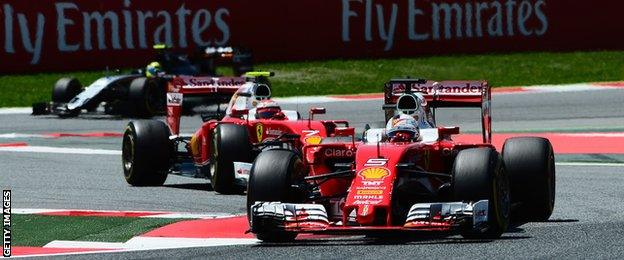
Ferrari believe they need to improve their tyre management strategies after struggling in the last two races in Spain and Monaco
If Red Bull are perhaps not yet ready to threaten Mercedes everywhere, they have now leapfrogged Ferrari, to pile on the pressure in what seems to be an increasingly difficult and frustrating season for the Italian team.
The Ferrari is faster than it was last year, comparing the first six races of the season, but only by a smidge, at an average of just 0.075 seconds. But their grid position has been no better - and in some cases worse.
They have gone from a position of being consistently second to Mercedes, to fighting with other teams for best of the rest - in Monaco, against teams such as Force India and Toro Rosso, which have less than half Ferrari's budget.
One stat that surprised me was that the last time Ferrari won the Monaco GP was in 2001. When Max Verstappen was three years old.
Ferrari have been badly afflicted by their inability to make the tyres work consistently in all conditions - and this is absolutely key in qualifying.
From time to time, they have hinted that they have decent race pace. But, as we said pre-season, unless they can qualify at the front, they will never have a chance to unleash it properly and win races.
Ferrari's problems may well be related to the higher minimum pressures Pirelli is mandating this year on safety grounds - pressures were higher by 12% (rear) and 18% (front) in Monaco.
That means the car itself needs to generate more mechanical grip because there is less from the tyre.
And if you do not have mechanical grip, then you need downforce. Which is partly why, other than Mercedes, Red Bull and Toro Rosso were both so strong in Monaco, because both have strong aerodynamic designs.
One of the interesting aspects of Ferrari's season is that Sebastian Vettel has not always been the quickest driver for that team.
Kimi Raikkonen won't have got any faster over the winter but he seems a bit more at home with the car. But in my opinion, ultimately Vettel should have 0.3secs on him. Which has not always been the case for whatever reason.
Tyre questions
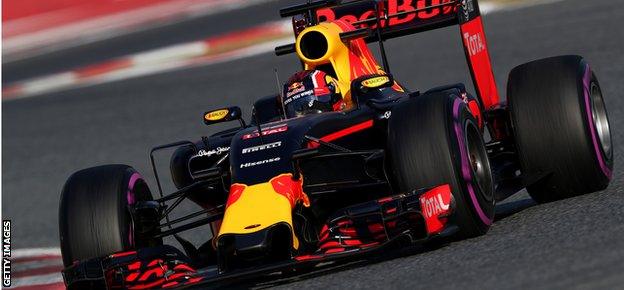
The new purple-walled Pirelli ultra soft tyre offers teams more strategy options
We've already discussed the high tyre pressures. The other issue with the tyres at the moment is that there does not seem to be enough difference between the various compounds.
Monaco has low grip and low abrasion, but the ultra-soft, super-soft and soft all did about the same number of laps in the race with the three podium finishers, Hamilton, Ricciardo and Perez.
That raises the question - how can you have the ultra-soft tyre, which was specifically designed for tracks like that, doing more than half a race distance? What's 'ultra' about that?
Basically, the softest tyre in the Pirelli range is not soft enough for this type of track and there is too little difference between the tyres - how they work depends mainly on how they fit to the track temperature.
Looking at the tyre choices for Canada, some of the teams have avoided the super-soft altogether - Renault and Haas have not chosen any sets of super-softs, sticking instead with the ultra-soft and soft.
This is because the super-soft has a low-temperature working range and the ultra-soft and soft have high-temperature working ranges.
So they are gambling on hot weather in Canada. If it's cool, those teams could be in trouble.
Allan McNish was talking to BBC Sport's Andrew Benson
Subscribe to the BBC Sport newsletter, external to get our pick of news, features and video sent to your inbox.
- Published3 June 2016
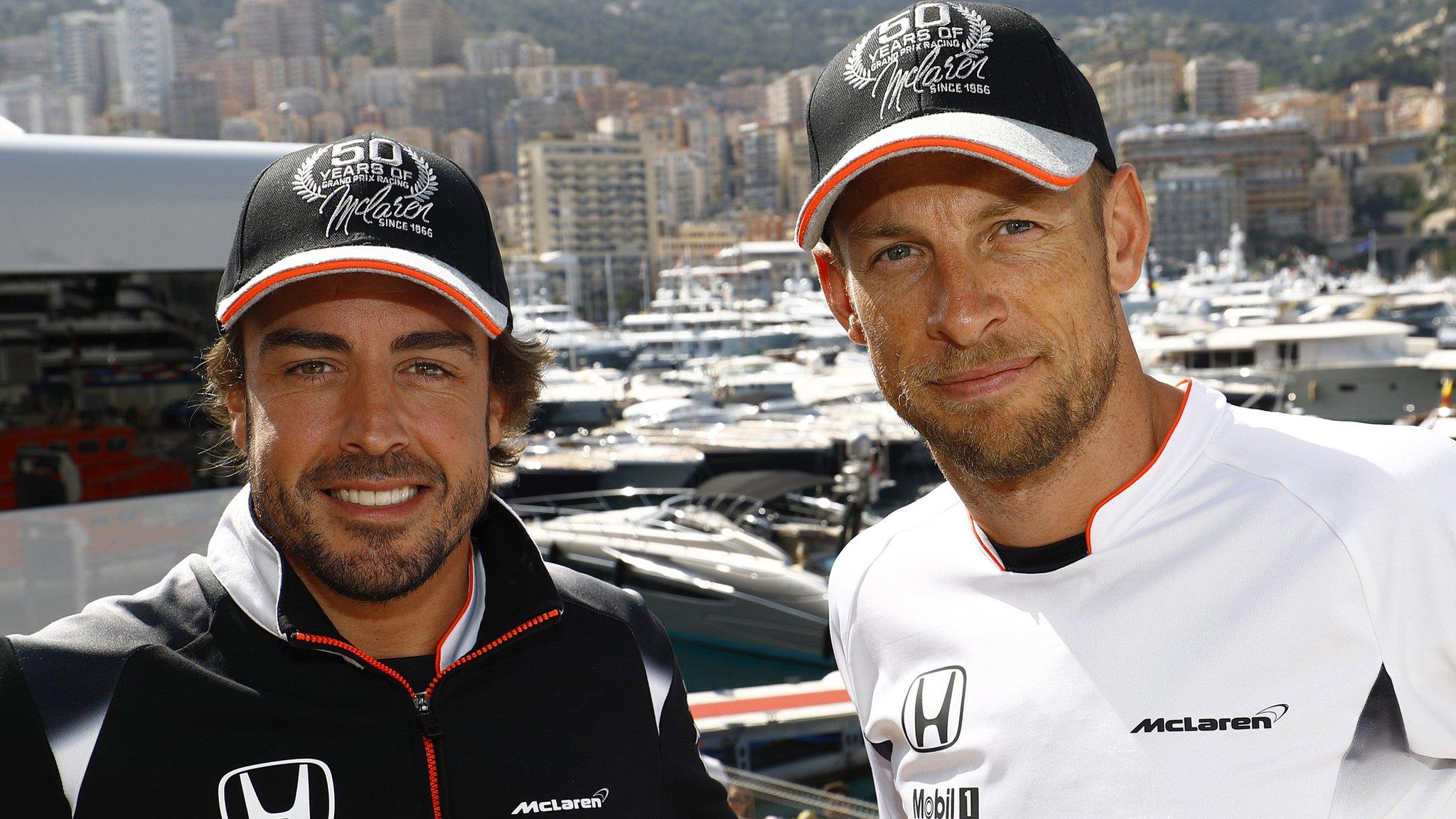
- Published29 May 2016
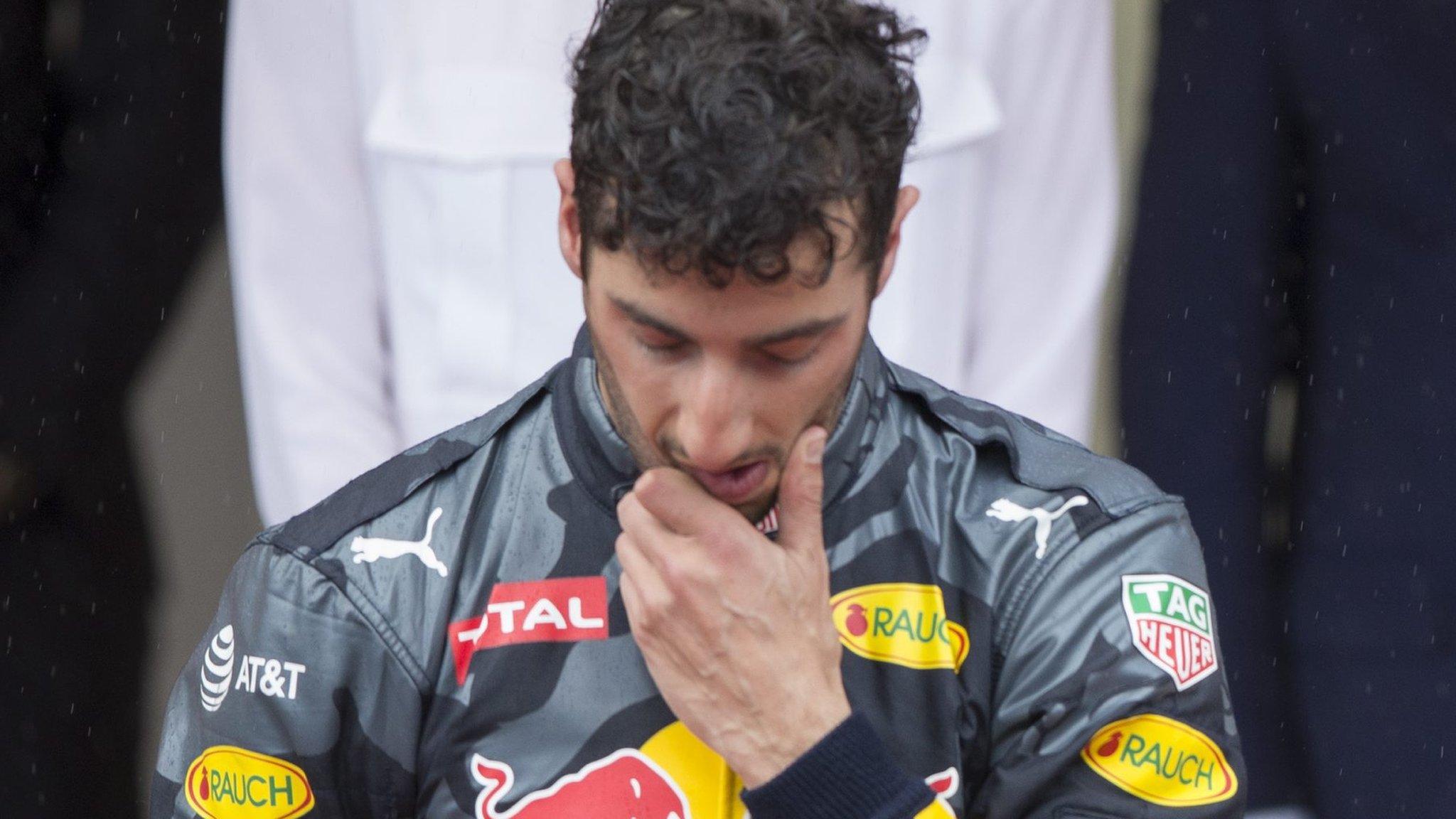
- Published30 May 2016
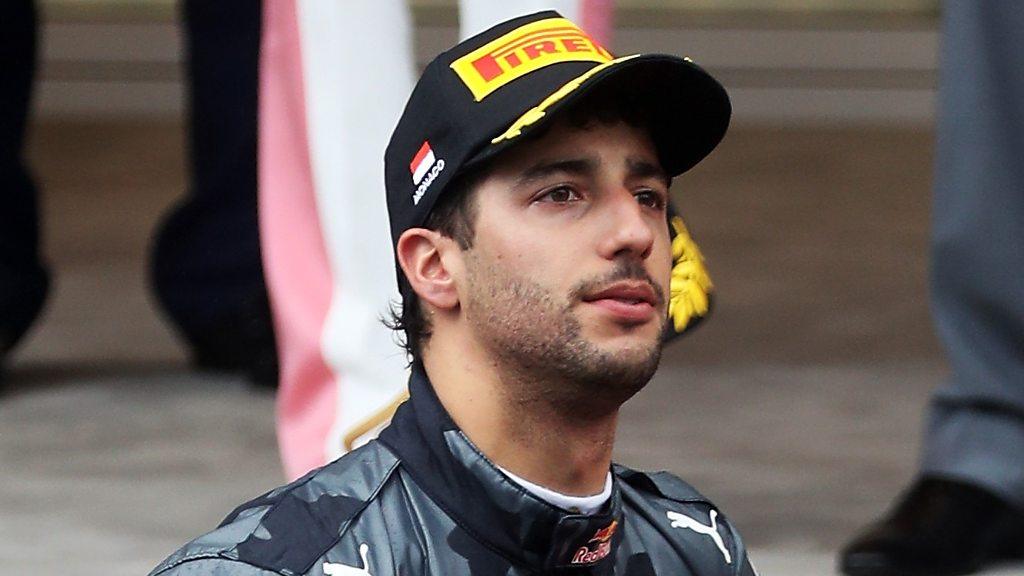
- Published29 May 2016
- Published29 May 2016
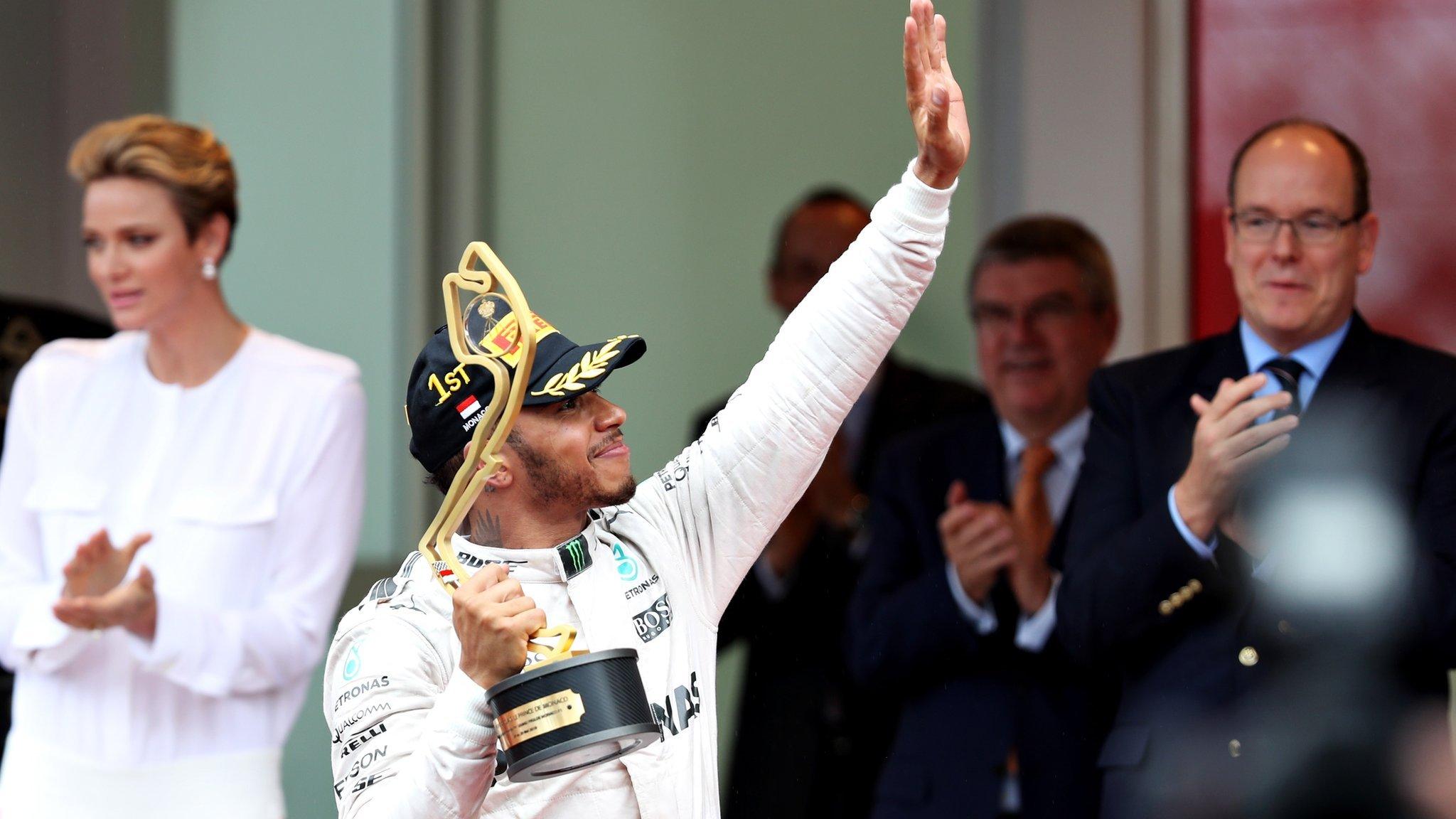
- Published18 December 2015

- Published2 November 2018

- Published13 May 2016

- Published26 February 2019
